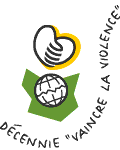International Seminar on Peace Building and Conflict Resolution
Galillee College Study Centre, Kibbutz Mizra, IsraelINTRODUCTION
"War appears to be as old as mankind, but peace is a modern invention."
Peace and conflict studies is an "academic field which identifies and analyses violent and non-violent behaviour as well as the structural mechanisms attending social conflicts with a view towards understanding those processes which lead to a more desirable human condition."
Civil and ethnic conflict, inter-state war, terrorism, poverty, the threat of weapons of mass destruction, the scourge of small arms, the negative impacts of economic globalisation, human rights abuses and the problems experienced by transitional and democratising societies are just some of the problems which confront us. Moreover, the changing political context which lies behind many of these problems makes this agenda ever more complicated. The nature of state sovereignty is constantly evolving.
Changing attitudes towards -and expectations of- governance are a source of upheaval across the world. Economic globalisation and interdependence continue to alter and sometimes to destabilise, the international economic order. These issues and challenges demand a forward-looking, innovative approach and one that conceptualises peace and security in the broadest sense.
One of the interesting developments in Israel with peace and conflict studies is the number of military personnel undertaking such studies. This poses some challenges, as the military is an institution supposedly committed to war-making. In a recent article "Teaching Peace to the Military", five principles that ought to under gird this undertaking, namely teach the just war theory, encourage students to be aware of the tradition and techniques of non-violence, encourage students to deconstruct and demythologise, and recognise the importance of military virtue.
OBJECTIVES
The programme will deepen understanding of the problems of conflict resolution, international relations and peace building, with particular reference to divided societies, by combining the study of theory and techniques with the analysis of particular problems in ethnic relations, including those within Africa, the Middle East and elsewhere internationally. The course offers a programme of study relevant to the needs of those employed, in areas where ethnic conflict arises.
In areas of conflict across the world the Centre addresses critical needs in the following areas:
- To understand and address the deep and underlying causes of conflict
- To support peace constituencies seeking to end the fighting and to bring warring parties to the negotiating table
- To enhance the roles of International Organisations in peacekeeping operations as conflict resolution interventions
- To work in post conflict situations in order to sustain cultures of peace through peace education and conflict resolution training.
CURRICULUM
The following subjects will be addressed:
- Governance and Conflict Management: The Roles of Aid Agencies, NGOs and Civil Society
- Reintegration of Former Combatants, Displaced Peoples and Refugees into Society as active citizens
- Globalisation - reducing the gap between rich and poor - achieving sustainable development for all
- Political Governance and Institution building – emerging democracy from authoritarian regimes
- The Influence of International Laws in Peace Agreements and Mediation Processes
- The Rule of Law and Human Rights in Peace building in Post Conflict Societies
- Electoral Systems and Electoral Violence
- The Impact of Climate Changes on Urbanisation - food security and sufficient clean drinking water without conflict
- The balance between population growth and resources without affecting social and political turbulence
- Conflict Prevention, Management and Resolution
- The Evolving Role of the Military in the Peace and Security Architecture
- The Role of Women in Post Conflict Reconstruction and Peace building - Women in governance to help improve the human condition
- Mediation and Peace building through Regional Arms Control and Disarmament Diplomacy
- Counter-terrorism and Anti-terrorism
- Radicalism and Military action - New security strategies to reduce ethnic conflicts, radicalism, and the use of weapons of mass destruction
- Opposing Islamic extremism at the ideological level
- The International Criminal Court (ICC) and War Crimes
- Natural Resources and Transitional Justice in Post-Conflict Situations
- Political, Legal, Economic, and Socio-economic influences on Peace building
- Functionality and Legitimacy in the Political and Legal Structures
- Civil Society implications in Post Conflict Societies – addressing vulnerable societies and ethnic groups
- Negative and Positive Peace
- The Triangle of Peace – Direct Violence, Structural Violence and Cultural Violence
- Concepts of Peace
COURSE METHODOLOGY
Lectures will be supplemented by case study analyses; group discussions and group work; workshops; study tours and simulations.
NOTE: The above curriculum outline is intended as a guide only. The sequence of course offerings is subject to change at the discretion of the administration.
Contact:
International Centre for National Security Studies (ICNSS)
Mark Street
Galillee College
P.O Box 208, Nahalal 10600 – ISRAEL
Fax: 972-4-651 4811
Phone: 972-4-642 8888
Website: www.galilcol.ac.il



